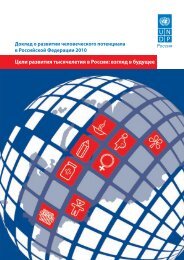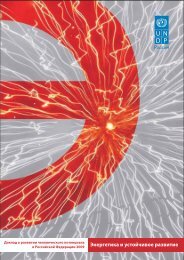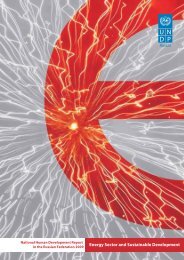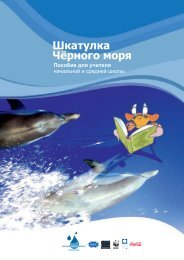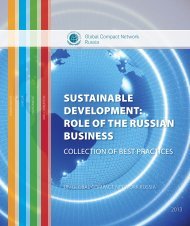The Ministry of Education and Science hasdeveloped a further target programme, to beimplemented in 2009–2010, which aims to developintegrated solutions to saving energy andresources for innovative development in varioussectors of the economy. The programme, which isbacked by Presidential Decree No. 889, ‘Onmeasures to improve the energy andenvironmental efficiency of the <strong>Russia</strong>n economy’(June 4, 2008), is part of a larger federal targetprogramme for development of education in2006–2010, approved by the <strong>Russia</strong>n governmentin its Resolution No. 803 of December 23, 2005(based on a decision by the Science CoordinationCouncil of the Ministry of Education and Science).The 2009–2010 programme is intended to mobilizethe know-how of scientific organizations, highereducation institutes and specialized privatecompanies in order to improve energy efficiency ofbuildings and structures, which are theresponsibility of organizations that are subject tothe Federal Education Agency.The programme is to be partly financed bynon-budget funds provided by educationalinstitutions themselves at a ratio of 1 rouble from thebudget to at least 1 non-budget rouble. Theprogramme is unique in its breadth of approach,spanning the whole range of energy-saving measures,from energy consumption research, estimate of theenergy savings, which are achievable for educationalinstitutions, to developing infrastructure forimplementation of energy-saving projects andmonitoring of results.In 2009 a package of measures wasdeveloped for energy saving and greater energyefficiency at educational institutions reporting to theFederal Education Agency. These measures are beingfinanced by the Federal Programme for Developmentof Education in 2006–2010. They target four mainareas:1. Developing a programme of specific energysavingmeasures to be implemented by educationalinstitutions in 2010;2. Developing modern laws and regulations tohelp save energy and improve energy efficiency;3. Establishing organizational structures (regionalenergy-saving centers) at leading universities toprovide informational, methodological andeducational support for energy-saving measures;4. Creating a system for training and retraining ofpersonnel in energy-saving and improvement ofenergy efficiency.The goal of the first item on the list is todevelop a set of measures that will give energysavings of up to 25% in buildings and structures runby educational institutions, which report to theFederal Education Agency, reducing utility bills(including those paid from the federal budget) whileimproving energy efficiency, and maintainingsufficient comfort levels inside buildings andstructures without increasing their environmentalfootprint. Such energy saving measures include:• Modernizing internal and external lightingsystems, introducing energy-saving and up-todatelighting equipment.• Upgrading the heat supply system in lecture hallsand dormitories.• Purchasing automated systems for monitoringand managing fuel &energy consumption andputting them into operation.• Installing energy efficient windows and walls toreduce heat loss from buildings;• Modernizing energy consumption systems byoptimizing consumer loads, introducingfrequency drives and automatic regulation ofventilation and air conditioning units;• Purchasing and installing metres on cold water,hot water and natural gas supply systems;• Purchasing autonomous generators foreducational institutions located in areas withfrequent power outages.The second area focuses on developing andtesting energy audit methods for educationalinstitutions, refining standard energy-savingmeasures, and developing economic mechanisms foreducational institutions that would allow them tostimulate energy saving and refinance some of theirenergy-saving costs using the money saved throughreduction of energy consumption. Regulations shouldbe developed on use of performance contracts andrevolving funds by educational institutions.The goal in the third area is to set up anetwork of energy saving centres at the country’sleading universities to carry out R&D and provide104 National Human Development <strong>Report</strong> in the <strong>Russia</strong>n Federation 2009
educational and informational support on issuesrelated to fuel & energy efficiency. Completion ofinfrastructure projects will enable progress to a systemof energy-service companies with links to energysavingcenters at major universities. These energyservicecompanies will then provide integratedenergy-saving services (energy audit, preparation ofdraft business plans, financing and implementation ofenergy-saving measures).The goal in the fourth area is to create asystem for training and professional development ofprofessors and instructors (as well as technicians ofthe engineering services of educational institutions)to develop their understanding of efficient fuel &energy use.A total of 16 universities, 4 regional energysavingcenters and 7 R&D enterprises participated inimplementation of the programme in 2009, and 100higher education institutions in 7 of <strong>Russia</strong>’s federaldistricts underwent energy audits. Each of theseinstitutions was given an energy certificate andrecommended a set of energy-saving actions. Anintegrated programme of energy-saving actions forhigher education institutions reporting to the FederalEducation Agency was developed with a budget of1195.7 million roubles for 2010. Implementation ofthese energy-saving actions will enable educationalinstitutions to achieve annual savings of 382.1 millionroubles from reduced energy consumption.A network of energy-saving centers wasestablished in all of the seven federal districts, basedon 36 leading universities. The following universitieswere assigned the role of coordinatingimplementation of energy-saving programmes in thefederal districts: Pacific Economic University, IrkutskState Technical University, Ural State TechnicalUniversity, Nizhny Novgorod State TechnicalUniversity, Moscow Power Engineering Institute(Technical University), St.Petersburg State EnergyUniversity, and North Caucasus State TechnicalUniversity.A new industry methodology for conductingenergy audits of educational institutions wasdeveloped and published. This methodology was sentto 500 higher education schools. A methodologymanual on saving energy in buildings and structureswas prepared. It contains recommendations on howto implement standard energy-saving actions atbudget-funded facilities, including educationalinstitutions.The coordinating universities set up a systemfor energy-efficiency training and retraining oftechnicians at other higher-education energy-savingcenters and for engineers working in theirmaintenance departments. Curricula and trainingprogrammes were developed for undergraduate andgraduate students as well as professionaldevelopment programmes for instructors, all focusingon efficient use of energy resources. In the third andfourth quarters of 2009, some 350 people from 86higher education schools in <strong>Russia</strong> received energysavingtraining.In July through October 2009, seminars wereheld at the coordinating universities in federal districtsto share experience of developing and implementingenergy-saving programs at educational institutions. Anational conference on energy saving at educationalinstitutions was held at R.E. Alexeev Nizhniy NovgorodState Technical University on October 28 and 29, 2009.The conference was attended by representatives ofhigher-education schools from 38 regions of <strong>Russia</strong>.These projects in 2009 cost a total of 93.2million roubles and created the conditions forsuccessful implementation in 2010 of an integratedenergy-saving action programme at the 100educational institutions, which underwent energyaudits and for which energy-saving programmes weredeveloped.105
- Page 1 and 2:
National Human Development Reportin
- Page 3 and 4:
National Human Development Reportin
- Page 5 and 6:
ACKNOWLEDGEMENTSThe authors express
- Page 7 and 8:
Dear Reader,You have before you the
- Page 9 and 10:
PREFACEThis is the 13 th National H
- Page 11 and 12:
country’s fuel & energy regions r
- Page 13 and 14:
environmental degradation and enhan
- Page 15 and 16:
Chapter 1The Energy Sector,the Econ
- Page 17 and 18:
By 2008 Russia had increased its sh
- Page 19 and 20:
the share of energy in the national
- Page 21 and 22:
exported, increased. However, this
- Page 23 and 24:
elimination of structural and terri
- Page 25 and 26:
• Establishment of competitive me
- Page 27 and 28:
number of developed countries, incl
- Page 29 and 30:
Although the United Nations Climate
- Page 31 and 32:
industrial region of the Urals - Sv
- Page 33 and 34:
2.2. Budget capacityand structure o
- Page 35 and 36:
(the Federal State Statistics Servi
- Page 37 and 38:
Immigration by young and highly ski
- Page 39 and 40:
energy regions exacerbate the incom
- Page 41 and 42:
Khanty-Mansi and Yamal-Nenets Auton
- Page 43 and 44:
the Ministry for Regional Developme
- Page 45 and 46:
various other long-term problems in
- Page 47 and 48:
is also associated with the fuel an
- Page 49 and 50:
Republic of Mordovia 8051 0.732 68.
- Page 51 and 52:
Legislative control of impact audit
- Page 53 and 54:
Chapter 3Personal Incomes, the Ener
- Page 55 and 56: than any other sources of income -
- Page 57 and 58: Are wages now the main instrument f
- Page 59 and 60: comparison of month-on-month develo
- Page 61 and 62: • The unemployed, people who aree
- Page 63 and 64: Employment in the energy sector acc
- Page 65 and 66: The share of household expenditures
- Page 67 and 68: subsidization practices in the regi
- Page 69 and 70: in power use between regions now de
- Page 71 and 72: Electricity prices for households h
- Page 73 and 74: • Steady decrease in the percenta
- Page 75 and 76: 1. The number of graduates with eng
- Page 77 and 78: As well as requiring better fuelcom
- Page 79 and 80: Box 4.1. The village of Kolvain Uss
- Page 81 and 82: continue to use solid fuel for a lo
- Page 83 and 84: Box 4.3. Ambient air pollution andp
- Page 85 and 86: either by large power generating fa
- Page 87 and 88: Box 4.6. A city at riskNovocherkass
- Page 89 and 90: In order to assess impact of thesee
- Page 91 and 92: generation facilities through safer
- Page 93 and 94: achieved in developed countries. So
- Page 95 and 96: equires 2-6 times more capital inve
- Page 97 and 98: government) should set targets and
- Page 99 and 100: networks. In 2007 government budget
- Page 101 and 102: enhancement is also important. Ener
- Page 103 and 104: energy efficiency of the transport
- Page 105: Box 5.1. Programme of the Ministry
- Page 109 and 110: mechanism for using national quota
- Page 111 and 112: Figure 6.2Share of electricity gene
- Page 113 and 114: One of the major benefits of renewa
- Page 115 and 116: odies; outdoor air; rocks and soil;
- Page 117 and 118: Design and construction of geotherm
- Page 119 and 120: Box 6.3. Prospects for nuclear powe
- Page 121 and 122: consists of out-dated equipment at
- Page 123 and 124: ConclusionThe world’s nuclear pow
- Page 125 and 126: 7.1. Impact of the fuel& energy sec
- Page 127 and 128: Table 7.5Solid waste from productio
- Page 129 and 130: Table 7.7Areas of disturbed and rec
- Page 131 and 132: nature of the impact (atmospheric e
- Page 133 and 134: Further, the economic cost ofenviro
- Page 135 and 136: trends continued the damage would a
- Page 137 and 138: What the government needs to do ino
- Page 139 and 140: Figure 7.2.1Specific atmospheric em
- Page 141 and 142: money value of industrial output) c
- Page 143 and 144: Figure 7.2.4Trends in specific atmo
- Page 145 and 146: Chapter 8The Energy Industry and Su
- Page 147 and 148: eing equal) it only reflects that p
- Page 149 and 150: (MDGs), issued by the UN in 2000. T
- Page 151 and 152: 8.4. The energy factorin integral i
- Page 153 and 154: Canada, the USA and Great Britain h
- Page 155 and 156: Box 8.2. Energy efficiencyindicator
- Page 157 and 158:
Box 8.4. Energy efficiency rating o
- Page 159 and 160:
41 Penza Region 116.0 -35.2 -4.542
- Page 161 and 162:
Appendix to Chapter 1Table 1.1. GDP
- Page 163 and 164:
Attachment to Chapter 4Table 4.1Rus
- Page 165 and 166:
Attachment to Chapter 4Volga Federa
- Page 167 and 168:
Attachment to Chapter 4Belovo Belov
- Page 169 and 170:
The previous National Human Develop



